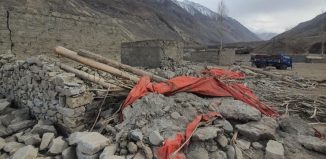Paving Paths to a Resilient Future
The communities in the Indus river delta encounter disastrous floods and other climatic hazards very frequently. The most devastating effects of these disasters reflect on the agrarian livelihoods of these communities. To combat these adverse impacts and to lead normal lives, communities must resort to alternative sources of income. In this fight for survival, women must equally participate in livelihood generation and disaster risk reduction activities.
Women of Rahim Dino Thaheem village in District Sujawal in Sindh, Pakistan are aware of these challenges and are responding in an exemplary way. Community World Service Asia (CWSA) is working closely with these women and their supportive communities, among many other in rural Sindh, to facilitate them in achieving economic empowerment.
This film tells the story of Bakhtawar, a young theater activist, who is spreading awareness about reproductive health and rights as well as against the generations long custom of child marriage. She has also managed to convince her parents about the importance of education and wants to continue her studies. She is an active participant in disaster risk reduction activities.
Shahnaz, a mother of nine, belongs to the same village and, despite hurdles from her family, has been able to earn a decent earning by joining the vocational center established by Community World Service Asia. Other than enhancing her skills, the center has also made her part of the Women Enterprise Groups, developed by CWSA, and connected her with sales agents that help her, and many other similar artisans, receive orders from renown fashion designers and urban fashion labels in metropolitan hubs of Pakistan. This practice has helped reduce the exploitation rural craftswomen face at the hands of middle-men as well as empowering them with a sustainable livelihood.
Through a comprehensive community empowerment project, Community World Service Asia is instilling messages of self-reliance as key to the resolution of both economic and social problems. Whether it is economic empowerment or disaster risk reduction, women are equal to men in resolving the issues confronting families and communities, leading them to pave paths to a resilient future.






